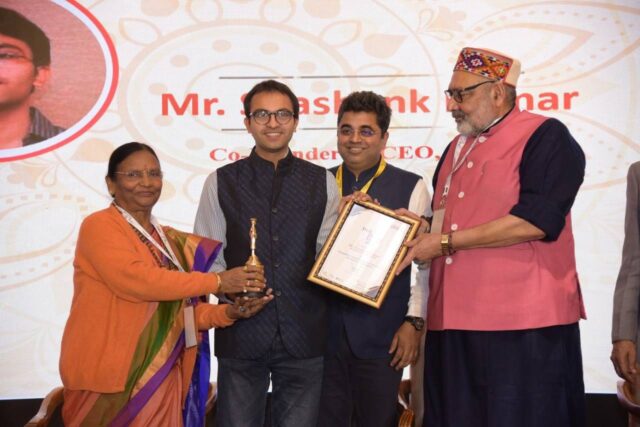Founded by alumni from IIT Delhi, IIT Kharagpur, IIM Ahmedabad and other top institutes – DeHaat is one of the fastest-growing start-ups in Agri Tech sector and one of the very few companies providing end-to-end solutions and services to the farming community in India.
Their operations spread over last 8 years have created a phenomenal impact at the grass root level and have been recognized and felicitated by NASSCOM, Forbes, ET, Niti Aayog, and Bill Gates Foundation.
Shashank Kumar, the CEO and Founder of DeHaat was facilitated as the ‘Most Innovative Personality for Rural Development & Agriculture’ by honourable Shree Giriraj Singh at the Desh Ratna Conclave organized by India Positive, in memory of India’s first President Dr. Rajendra Prasad.
Agritech platform DeHaat has raised $115 million as a part of its Series D funding round led by Belgium-based investment firm Sofina and Lightrock India. The company plans to use the proceeds from the current fundraise to expand its geographic focus, increase investment in technology infrastructure, as well as increase the spread of financial services offerings. Post this round, the company has raised close to $157 million since its inception in 2012.
DeHaat earlier acquired Farm Guide, a B2B Software as a Service ( SaaS) platform. FarmGuide was founded in 2016 by IIT Delhi alumni Nikhil Toshniwal and Ankit Gupta. The duo developed a SaaS-based platform by using satellite-based data for detecting farm boundaries and data-driven customized crop advisory services. Farm Guide’s spatial technology and data science will be integrated with DeHaat’s existing platform to build a full-stack platform for agribusiness. The founding team of FarmGuide will also now be a part of DeHaat.
Dehaat model was designed to provide customized solutions under one roof almost everything that too under 3-5 km of range. Farmers can get quality of input directly from manufacturers thus reducing their input cost, they may get advisory service based on input purchased and crop they grow, they can also sell their produce directly to institutional buyers at the end of cropping season.
DeHaat model was planned to work on COCO (Company-owned – company operated) based franchise model. Franchise owners are supposed to play a role more than just a distributor. People from farming community usually a local youth age of 25-40 is preferred, educated up to senior secondary level, and is comfortable using Android phone. Such youth are trained and nurtured to become microentrepreneur and makes personal touch with farmers. The microentrepreneur has to initially bring capital of 3-4 lakhs and can earn upto 12000-18000 per month by serving 600-800 farmers within the radius of 3-5kms on average working 4-5 hrs in a day.

The company, presently, has a strong foothold in eastern part of India including the states of Bihar, Jharkhand. With the fundraise, the company will look to go deeper in Indian states of Uttar Pradesh, Madhya Pradesh, and Rajasthan this year. The company is also looking to expand its footprint across Andhra Pradesh, Telangana, and Chattisgarh.
Currently, DeHaat serves over 650,000 farmers across its platform. It has a network of 3000 franchise agents on ground acting as last mile touchpoints for its customers. The company plans to reach 2 million farmers and grow its last-mile touchpoints to 12000 franchise agents in the next 18 months.

What is DeHaat
More than 50% of India’s population is dependent on agriculture for their livelihood. At 157.35 million hectares under cultivation – the second highest in the world – provides enough scope for technology to make farmers’ lives easier, and increase yield and output.
DeHaat is an ICT based platform that offers end-to-end agriculture services to Indian farmers with the aim to improve the efficiencies of the agriculture value chain by bringing small farmers under one roof. It connects small farmers to their various needs – Seeds, fertilizers, equipment, crop advisory & market linkage of agri produce through a wide network of trained micro-entrepreneurs.
How does it work?
Currently, DeHaat is focusing on three major services – agricultural input, crop advisory, and market linkage for farm produce.
Firstly farmers need to register to get access to a wide range of agricultural inputs (Seed, Fertilizer, and Crop protection) directly from competitive sources.
After that, they get customized crop reminder call in the local language and crop monitoring support from the same DeHaat micro-entrepreneur.
Last, they sell the farm produce directly to institutional buyers. Farmers can place their various demand related Agri input, field visit, or Agri output either through the toll-free number or mobile application and get last-mile services through assigned micro-entrepreneur.
Orders were sent forward to DeHaat’s micro-entrepreneurs and fulfilled the same day. Each DeHaat micro-entrepreneur caters to 600-800 farmers in a radius of 3-5 km.
It is the one-stop solution for farmers for all their farming needs; eliminating the multiple middlemen at each stage – from advising them on what to cultivate and how to cultivate in a highly customized way, analyzing the right & customized set of inputs for them, and making it available directly from manufacturers, farm mechanization and finally marketing their produce to fetch the best rates.
DeHaat generates its revenue from:
a) Input analysis, planning & linkage
b) Low cost crop advisory services: INR 200 per farmer per year
c) Output linkage Local channel partners work on incentive-based model. While working with 450 farmers, a rural entrepreneur earns INR 5000 monthly from above mentioned services. While solving pain points of farmers, in house revenue engine & tech-based solution make the model sustainable.















